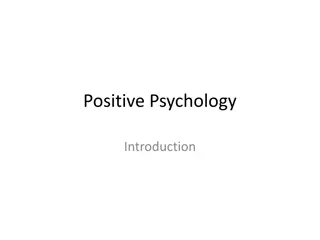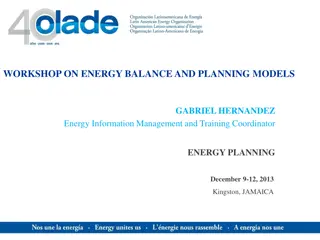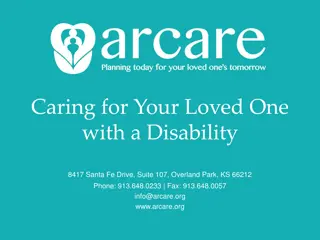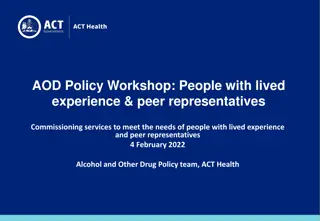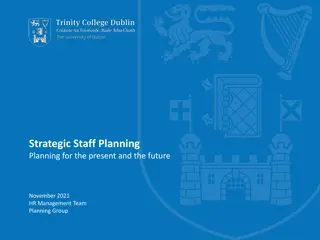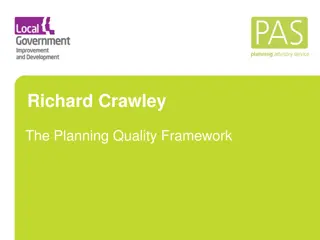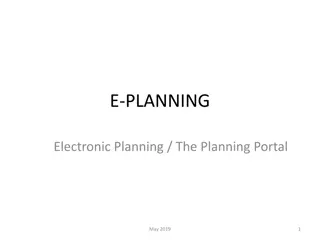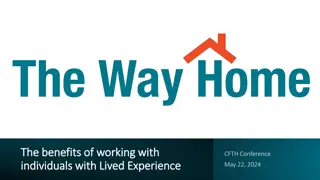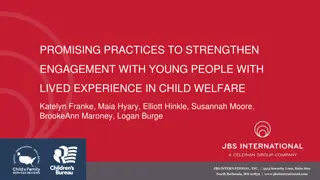Better Planning for Longer Lives - Prepare Now for a Longer Life Lived Well
We are living longer, yet many of us fail to plan for the future. Learn about dementia, estate planning, and more to ensure a secure future for yourself and your loved ones. Take steps now for a fulfilling and well-lived longer life.
Download Presentation

Please find below an Image/Link to download the presentation.
The content on the website is provided AS IS for your information and personal use only. It may not be sold, licensed, or shared on other websites without obtaining consent from the author.If you encounter any issues during the download, it is possible that the publisher has removed the file from their server.
You are allowed to download the files provided on this website for personal or commercial use, subject to the condition that they are used lawfully. All files are the property of their respective owners.
The content on the website is provided AS IS for your information and personal use only. It may not be sold, licensed, or shared on other websites without obtaining consent from the author.
E N D
Presentation Transcript
BETTER PLANNING FOR LONGER LIVES PREPARING NOW FOR A LONGER LIFE LIVED WELL
Better Planning We are living longer! The fastest growing age group are those 85 years of age and older But the median age for men and women combined is 79 years of age and it has held constant at 79 for the past few years. The longer we live - and living longer feeling well the less likely we plan for the future. It seems like it will always be there. We are living today what was the future two years ago, so we keep talking future until . There are many obstacles to this illusion of growing older without a thought for planning for the future. One obstacle has gotten a lot of attention lately and that is a cluster of brain diseases resulting in a collection of discouraging symptoms called DEMENTIA
Defining Terms Dementia: a collection of symptoms that are fairly common across several brain diseases. The brain diseases go by the names of vascular dementia, Alzheimer s disease, Parkinson's disease. Perhaps as many as 20 brain diseases. Of all brain diseases that affect memory, Alzheimer s disease is the most common at about 60% (some estimate as high as 80%). The symptoms vary, but universally these brain diseases affect memory and memory loss and memory-loss related issues. Because memory loss is often synonymous with the word dementia, people often call brain diseases that affect memory dementia. The reality is that dementia is better described as the collection of symptoms experienced by people with one of the 20 brain diseases affecting memory.
Estate Planning Estate refers to our property and property can be real or personal. Example of real property: house, condominium, share of a family cottage, apartment building you own for rental income, cabin in the woods, hunting land in the UP Example of personal property: personal to you like furniture, clothing, jewelry, computer, china, wood-working tools. Personal property can be intangible (can t see it or touch it) like bank account, certificate of deposit, investment account, IRA, life insurance policy, etc. Planning refers to what are your thoughts about what should happen to your property if in the future you no longer can make decisions or you are no longer living. Estate planning is writing down (executing) your thoughts about to whom to transfer your property (wealth). Or, estate planning is the transfer of wealth.
Planning for today Durable Power of Attorney for Health Care >Must have the ability to contract: understand expectations and consequences of signing a contract >Agency law: stand in your shoes & make decision you would if able; best interests >Standard for stepping into the shoes: unable to participate in making medical decisions, giving informed consent >Person who steps in your shoes is the Patient Advocate >Decisions include removing life-sustaining treatment, do-not-resuscitate, end of life, funeral, burial or cremation, organ donation, choose doctor, move in/out nursing home >Have more than one Patient Advocate and more than one can serve at the same time
Planning for today Durable Power of Attorney for Finances Must have the ability to contract: understand expectations and consequences of signing a contract >Agency law: stand in your shoes & make decision you would if able; best interests >Standard for stepping into the shoes: disability/incapacity -unable to manage affairs leading to waste, fraud, loss, harm; cannot communicate informed decisions >Person who steps in your shoes is the Fiduciary Agent >Decisions include sell property, use credit cards/bank accounts, investments, file taxes, apply for government services, open your mail, pay bills, arrange for long term care >Have more than one Fiduciary Agent, but only one can serve at a time
Between today and the future >Look at financial picture: what do you want, what can you afford, how do you get there?, what is the alternative? >Where do you want to live or die? Majority of people want to live and die at home. Look at costs of staying home and paying for in-home care vs look at cost of independent living, assisted living, nursing home. Can you get the care you need in a facility for less money? Is a long term care contract (more cost) better if you are cared for until death? >Look at your support network: May or may not be easier if you are married. Even if married now, may not be married when additional help is needed. Who lives nearby to help? Who are your caregivers and how much time can they give to your care? Who monitors caregivers is you are unable to do so? EMPHASIZE: EXPLORE OPTIONS BEFORE YOU NEED THEM; BEFORE DECISION-MAKING GONE
Planning for the future (today was the future of our yesterday) >Identify what you have and divide into groups: This group of items has a title/deed and beneficiaries are needed to pass on the title This group of items allows for a beneficiary designation and beneficiaries are needed to receive the value of the items This group of items has been given an account number and beneficiaries are needed to collect on the account This group of items has sentimental value and beneficiaries are needed who will enjoy the items This group of items should be donated because other people will benefit from them This group of items you can let go of; others may find a treasure among them
Planning for the future LAST WILL AND TESTAMENT: Planning begins and ends today; document stays on the shelf until death; designed for quick transfer Important to get everything in order today; might be best suited to person with dementia symptoms if unable to change the plan down the road REVOCABLE TRUST: Planning begins today and continues; document stays on the kitchen table because you can keep stirring the pot; designed for quick transfer or slow release (one size doesn t fit all) Important to make transfers to trust for trustee to manage down the road and after death
Estate Planning may avoid three things GUARDIANSHIP CONSERVATORSHIP PROBATE NONE of these three things are bad. It is possible to avoid them with good planning Better Planning for Longer Lives: Preparing Now for a Longer Life Lived Well
THANK YOU FOR COMING TODAY! BETH A. SWAGMAN, MSW, ACSW, JD BETH A. SWAGMAN PLLC 4403 CASCADE ROAD SE, SUITE 10 GRAND RAPIDS, MI 49546 616.323.3443 BETH@SWAGMANESTATEPLANNING.COM



